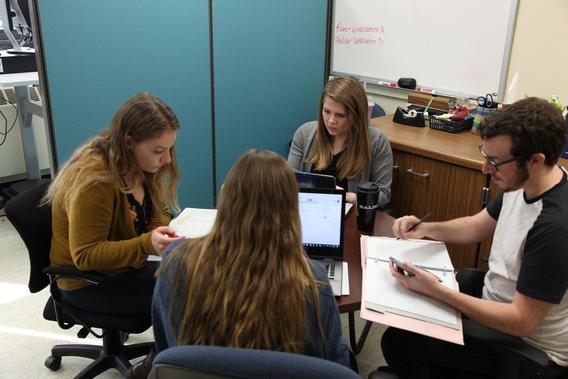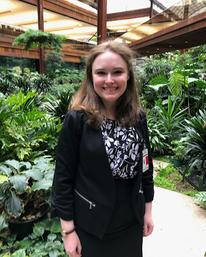Industrial-Organizational Psychology students are immersed in scientific research to acquire the knowledge and skills to solve workplace issues in a variety of areas such as:
- personnel selection
- employee motivation
- training and development
- performance management and evaluation
- organizational change and development
Students apply these skills through projects with real organizational clients. Graduate students are trained to be evidence-based practitioners and prepared to pursue doctoral-level training.
In SIOP surveys of 69 Industrial-Organizational Psychology master's programs, MAPS Industrial-Organizational Psychology was:
- ranked #4 in student accomplishments
- ranked #7 in student ratings of faculty quality
- ranked #18 in program resources
Congratulations, Dr. Alexandra Luong!
Accessible and engaging, this textbook introduces students to the field of personnel psychology, also known as industrial psychology.
Based on their years of teaching in this area, Luong, Sprung, and Zichar survey core topics in the field, including job analysis, recruitment, selection, assessment, and performance evaluation. Throughout, they emphasize a psychological - rather than management -approach, explaining the key psychological principles that underpin human resources practices. Supported by plentiful examples, review questions, and discussion questions, this comprehensive overview shows how personnel psychologists endeavor toward a better workplace.
Written in a clear and captivating style, this book introduces students to the most recent and pertinent scientific research in personnel psychology, and inspires Future study in industrial-organizational psychology and related fields.
Dr. Alexandra Luong is an Associate Professor, Department of Psychology, University of Minnesota Duluth.
+
Faculty & Research
Industrial-Organizational faculty profiles
Alexandra Luong
Kyle Mann
Julie Slowiak
Full listing of Industrial-Organizational research labs.
+
Student Research
Industrial-Organizational Psychology students receive one-on-one mentorship from their faculty advisor to help them design and conduct an independent research project (6-credits; PSY 8099 Research Project in Psychology Plan B). The project may be empirical research, applied projects, or a meta-analysis under the direction of a faculty advisor. Students receive committee feedback on the oral and written project proposal and final completed project. The caliber of these projects is such that graduates who go on to doctoral programs have had their final papers accepted in fulfillment of master's thesis requirements, and some graduates have published their research findings in peer-reviewed journals.
Past Student Research Projects
Reactions toward anonymized reviews in selection – Sebastian Banuelos
Job decision latitude and job burnout: A moderated mediation model of work ability and job crafting – Jessica Cole
The role of leader health orientation on the relationship between employee self-care and job burnout among applied behavior analysis practitioners – Kalei Kleive
Work ability and job burnout: A moderated mediation model of health-related organizational climate and work-health management interference – Mariah McDonough
Telecommuting intensity's impact on job satisfaction and burnout: moderated mediation model of work-family conflict and emotional intelligence – Katherine Sanchez
The effects of emotional labor on recover experience and leisure satisfaction – Carlie Servais
Perceptions of applicants who deceive: Does physical attractiveness matter? – Jay Burditt
The impact of gender emotional expression stereotypes on leader evaluations – Claire Theisen
Leadership style preferences: A study of gender and personality – Bethany Westerberg
The moderating role of social support on the relationship between surface acting and burnout – Abby Imholte
Examining the relationship between work demands and burnout during covid-19 and the moderating effects of professional social support and psychological flexibility – Georgia Jay
Fairness perceptions and reciprocity of backup behavior and the effects on individual perceptions of team viability, team cohesion, and self-efficacy – Rebecca Lindgren
Examining the relationship between diversity climate, psychological safety, and occupational self-efficacy – Kwesi Adjei
Work/Family conflict and work engagement during the covid-19 pandemic: The Role of Autonomy, Family Supportive Supervisor Behaviors, and Family Hours – James Clairmont
Crafting employee work-life balance – Amanda DeLongchamp
Abusive supervision and burnout: The moderating role of subordinates’ neuroticism and time spent with the supervisors – Jie Yu
Intervening when ostracism occurs: Individual differences and psychological safety as predictors – Lauren Brown
Empathetic expression as a job requirement: Empathy as a moderator of emotional labor and health outcomes in employees – Dallas Capesius
Females leading like males: When agentic female leaders perceive sex-based mistreatment – Maggie Gauer
Evaluating the effects of an intervention to increase feedback as a social job resource – Dayan Maas
The effects of feedback-seeking behavior and difficult goals on task performance and task-induced stress – Jean Dougherty
The effects of working at home during covid-19 on sedentary behavior, use of strategies to decrease sedentary behavior, and perceived work performance – David Huntley
The impact of origin of performance goals on task performance and stress – Katherine Klein
Examining the relationship between psychological ownership and knowledge sharing – Harry Kohn
The effects of coloring and mindful audio work recovery techniques on task performance, boredom and job satisfaction – Clair Anderson
A thematic analysis of workplace health program participation – Brandon Breuer
The dark triad as a moderator of the relationship between overqualification, counterproductive work behaviors, and organizational citizenship behaviors – Lauren Engelhart
Social networking sites in applicant screening: Attitudes toward filtered profiles – Michael Unzen
The effects of leadership on performance and satisfaction across virtual communication media – Jared Vincent
Stepping Up UMD Group Health Coaching: A behavioral intervention – Matt Daly
The influence of feedback sequence and a challenging goal on task performance – Areanna Lakowske
Reactions to a continuous feedback intervention in a software company – Kenzie Raboin
Job hopping motives: An extension of the unfolding model of voluntary employee turnover – Alison Shrift
Effects of framing and timing on realistic job previews – Mike Ward
Workgroup emotional climate: Individual inputs and group cohesion – Jessa Youso
+
Curriculum
Course Descriptions
PSY 5052 - Advanced Statistics I (3.0 cr) Advanced statistics used for experimental and correlational research in psychology; analyze data from simple and complex research designs; analysis of variance and linear regression techniques; hypothesis testing; nonparametric statistics; assumptions of tests and diagnosis of assumption violations; interpretations of results; use of common statistical software (e.g., SPSS or R).
PSY 5111 - Advanced Personality Science and Research (3.0 cr) Modern personality theory and the empirical research that supports it; emphasis on major issues that confront personality psychologists in the conceptualization and assessment of personality; relationship between personality and consequential outcomes (such as mental illness, physical health, interpersonal relationship quality, job performance, etc.); mixed designs for conducting research on interactions between traits and experimentally manipulated conditions.
PSY 5401 - Advanced Social Psychology (3.0 cr) Examination of core content areas and topics within experimental social psychology with a focus on application within both clinical and industrial/organizational psychology. Topics include attitude formation and attitude change, attribution theory, the self, conformity, prejudice, aggression, and prosocial behavior.
PSY 5621 - Cognition and Emotion (3.0 cr) Students in this course will read and discuss scholarly reviews and journal articles on theories, research methodology, and topics central to the scientific study of human cognition, emotion, and their applications. There will be discussions on the models of cognitive (perception, memory, language, thinking, and reasoning) and emotional processes and their interrelatedness. Consideration will be given to how these contemporary models are developed and evaluated through empirical studies. Finally, how these theoretical models can be applied to educational, clinical, legal, and workplace settings will be examined.
PSY 5701 - Advanced Personnel Psychology (3.0 cr) Students will apply theories and research findings to address issues of personnel recruitment, selection, and classification in the workplace.
PSY 5702 - Advanced Organizational Psychology (3.0 cr) This course covers core content in organizational psychology, with a focus on understanding of research findings to enhance organizational functioning and employee well-being. Topics include employee motivation, job attitudes, work stress, teams, leadership, and organizational justice and culture.
PSY 8021 - Research Methods and Evaluation (3.0 cr) Examination of quasi-experimental and experimental designs within psychological science. The course will provide comprehensive coverage of the assessment of reliability and validity of measures, methods, and research designs to facilitate the development of a research proposal. A wide variety of quantitative and qualitative research designs, measurement techniques, and methods will be described and evaluated in terms of internal, external, construct, and statistical conclusion validity.
PSY 8052 - Advanced Statistics II (3.0 cr) Advanced statistics used for experimental and correlational research in psychology; analyze data using advanced univariate, basic multivariate, and meta-analytic techniques; assumptions of test; diagnosis of assumption violations; interpretation of results; use of common statistical software (e.g., SPSS or R).
PSY 8099 - Research Project in Psychology (6.0 cr) This course provides a capstone experience for students to integrate all they have learned in order to produce scholarly work. Under the guidance of a faculty advisor, students will plan, design, conduct, and present an original project.
PSY 8103 - Introduction to Graduate Studies (0.0 cr) This course will orient new students to key facets of graduate studies in the Master's in Psychological Science Program. Program expectations, requirements, and timelines will be clarified to enable students to make progress in formulating goals in their chosen tracks. This course will provide students with a basis for academic collaboration and professional development by facilitating student interactions with peers and the faculty in psychology.
PSY 8701 - Performance Evaluation and Management (3.0 cr) This course centers on the methods of evaluating performance and on actions taken with employees based upon such appraisals. Theoretical understanding and familiarity with research on interpersonal judgment and perception, criterion theory and development, rating scale construction and use, sources of information, and effective communication will help students in this course develop skills in designing performance appraisal and feedback systems which meet organizational needs while enhancing employee motivation.
PSY 8705 - Organizational Systems and Development (3.0 cr) This course is designed to cover topics central to organizational systems and development, including classical and contemporary theories of organizations, organizational structure, organizational design, technology, and cross-cultural differences and issues. Students will learn how to integrate theory, research findings, and applied techniques to help organizations adapt within the ever-changing local and global environment.
PSY 8706 - Personnel Training and Development (3.0 cr) This course is designed to cover topics central to personnel training and development. This course requires the integration of theories, tools, concepts, and techniques learned in the classroom with an application in a "real" organization. Students will learn how to analyze performance deficiencies in order to determine whether training is required and, if so, how to design and implement effective training to help fix performance problems. Basic phenomena of learning, various training and development approaches commonly used in business and industry, and design issues necessary for planning evaluation and improvement strategies will be covered.
PSY 8991: Graduate Applied Projects in Psychology (1.0-2.0 cr) Under faculty supervision, students will work on applied psychology projects.
Example Electives:
- PSY 5111: Advanced Personality
- PSY 5401: Advanced Social Psychology
- PSY 5621: Cognition & Emotion
- PSY 8991: Graduate Applied Projects in Psychology
- MBA 6111: Organizational Behavior
- MBA 8811: Human Resource Challenges
- MGMT 6033: Strategy Implementation
- MGMT 6084: Management of Teams
- SAFE 6012: Risk Management and Workers Compensation
- SAFE 6821: Organization and Administration of Safety Programs
Example Schedule
Fall, First Year
5052 Advanced Statistics 1 (3)
5701 Advanced Personnel Psychology (3)
5702 Advanced Organizational Psychology (3)
8103 Introduction to Graduate Studies in Psychology (0)
Spring, First Year
8021 Research Methods and Evaluation (3)
8052 Advanced Statistics II (3)
8705 Organizational Systems and Development (3)
Fall, Second Year
8099 Research Project in Psychology (Plan B) (3)
8706 Personnel Training and Development (3)
Elective (3)
Spring, Second Year
8099 Research Project in Psychology (Plan B) (3)
8701 Performance Evaluation and Management (3)
Elective (3)
+
Applied Experience
Industrial-Organizational Psychology graduate students receive close mentorship and work collaboratively throughout the program on applied projects. Students move beyond classroom learning through the application of theories and models to assist clients in businesses and organizations.

Past Student Applied Projects
Recruitment and Personnel Selection Projects
- evaluated the career website of a large manufacturing company and provided research-based recommendations to enhance applicant attraction
- presented research on structured interviews for hiring managers of a large nonprofit organization
- evaluated a healthcare hiring system
- presented research and recommendations on using social media for recruitment and selection to local HR professionals
Employee motivation
- surveyed the job satisfaction of local nonprofit employees
Training
- designed and delivered in-person training to classmates on creating professional LinkedIn profiles and the use of LinkedIn to network with other professionals
- designed online training modules to teach managers how to mediate interpersonal conflict between employees
Performance management
- trained managers to give effective feedback to employees
- provided research-based recommendations to a retail organization regarding the move from a formal evaluation system to a frequent performance management process
Performance evaluation
- designed a performance evaluation form used in the annual review of college administrators
Organizational Systems and Analysis
- organizational system analysis and provided research-based recommendations to:
- improve new coach training and new manager onboarding processes at two fitness facilities
- develop a new process to gather and evaluate employee satisfaction data at a behavioral services organization
- improve efficiency of maintenance operations at a military organization
- develop career progression progress for assembly technicians at an aircraft manufacturing company
+
Internships
Industrial-Organizational graduate students often intern with organizations while completing the MAPS program. Internships are not required, but allow students to further their professional development and apply the skills and knowledge acquired from coursework. For example:
- Customer and employee development at a large manufacturing company
- International Industrial-Organizational consulting firm
- Instructional design
- Human resources at a large bank
+
Networking & Professional Development
Industrial-Organizational Advisory Board at UMD
Industrial-Organizational Psychology students and faculty host an advisory board meeting every semester with organizational leaders and human resources professionals from local businesses and organizations. Students share scientific research related to workplace issues and board members discuss their related experiences in real world settings.
Testimonials
As an Advisory Board member since the inception of the Industrial-Organizational Psychology program, I am continuously impressed by the dedication and curiosity of both our faculty and master's level students. Through rigorous research and application, our students consistently demonstrate a commitment toward making workplaces more efficient, pleasant, and productive. UMD's Industrial-Organizational program provides students with the tools and experience necessary to confidently apply their practice in fields such as human resources or organizational management and leadership.
- Lindsay Snustad, Lead Treatment Court Coordinator for the Sixth Judicial District
As an Advisory Board member since the inception of the program I have gained a strong respect for the students and faculty in the Industrial-Organizational Psychology Masters Program. The students are highly trained in evidence-based practices by faculty dedicated to student development. The students benefit from close mentoring relationships from faculty on a weekly basis. The program maintains active relationships with businesses and non-profit organizations through collaborative research projects, ongoing dialog, and the Advisory Board meetings. As a result, graduates are prepared to successfully enter the workforce or to pursue advanced training in a Ph.D. program.
-Dr. Peter Guidinger, Director, Employee & Customer Development - Fastenal
Conferences and Meetings
Psychology master's students and faculty present research at conferences including the annual Society for Industrial and Organizational Psychology (SIOP) conference. Psychology graduate students are eligible for travel funding support when presenting research findings.
Consulting Challenge

Industrial-Organizational graduate students have the opportunity to participate in the Consulting Challenge. Competing with other schools, this team-based challenge involves developing a solution to a real problem facing a large Minnesota company. UMD Industrial-Organizational psychology student, Bethany Westerberg, competed in 2022 and her team won 2nd place out of 10 teams.
Invited Talk
Graduate students hold panel discussions and other talks for undergraduate students in the Industrial-Organizational Psychology Club.
Alumni Connections
Industrial-Organizational Psychology alumni connect with current Industrial-Organizational psychology students and faculty in a monthly meeting.
Industrial-Organizational psychology alumni, faculty, and current students of the University of Minnesota Duluth's master's program are invited to join a private LinkedIn to network, as questions, and provide industry updates.
